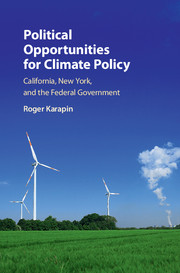Crossref Citations
This Book has been
cited by the following publications. This list is generated based on data provided by Crossref.
Siddiki, Saba
Carley, Sanya
Zirogiannis, Nikolaos
Duncan, Denvil
and
Graham, John
2018.
Does dynamic federalism yield compatible policies? A study of the designs of federal and state vehicle policies.
Policy Design and Practice,
Vol. 1,
Issue. 3,
p.
215.
Besco, Laurel
2018.
Responses to the Clean Power Plan: Factors Influencing State Decision‐Making.
Review of Policy Research,
Vol. 35,
Issue. 5,
p.
670.
Homsy, George C.
2018.
Climate Change in Cities.
p.
19.
Cyrs, Tom H.
2018.
Enabling Renewable Energy on both Sides of the Meter: a Focus on State-Level Approaches in New York and Texas.
Current Sustainable/Renewable Energy Reports,
Vol. 5,
Issue. 1,
p.
45.
Carter, Neil
2018.
The Politics of the Environment.
Meckling, Jonas
and
Nahm, Jonas
2018.
The power of process: State capacity and climate policy.
Governance,
Vol. 31,
Issue. 4,
p.
741.
Stevis, Dimitris
2018.
US labour unions and green transitions: depth, breadth, and worker agency.
Globalizations,
Vol. 15,
Issue. 4,
p.
454.
Wendler, Frank
2019.
The European Parliament as an Arena and Agent in the Politics of Climate Change: Comparing the External and Internal Dimension.
Politics and Governance,
Vol. 7,
Issue. 3,
p.
327.
Gronow, Antti
Ylä-Anttila, Tuomas
Carson, Marcus
and
Edling, Christofer
2019.
Divergent neighbors: corporatism and climate policy networks in Finland and Sweden.
Environmental Politics,
Vol. 28,
Issue. 6,
p.
1061.
Smith, Ida Dokk
2019.
Renewable Energy.
p.
91.
Boyd, Brendan
and
Rabe, Barry
2019.
Canada–US Relations.
p.
239.
Jakob, Michael
Soria, Rafael
Trinidad, Carlos
Edenhofer, Ottmar
Bak, Celine
Bouille, Daniel
Buira, Daniel
Carlino, Hernan
Gutman, Veronica
Hübner, Christian
Knopf, Brigitte
Lucena, André
Santos, Luan
Scott, Andrew
Steckel, Jan Christoph
Tanaka, Kanako
Vogt-Schilb, Adrien
and
Yamada, Koichi
2019.
Green fiscal reform for a just energy transition in Latin America.
Economics,
Vol. 13,
Issue. 1,
Lortie, Christopher J.
St John, Julie
and
Spangler, Will
2019.
Do or do not. There is no try in restoration ecology.
Restoration Ecology,
Vol. 27,
Issue. 5,
p.
955.
Stefes, Christoph H.
2020.
Opposing Energy Transitions: Modeling the Contested Nature of Energy Transitions in the Electricity Sector.
Review of Policy Research,
Vol. 37,
Issue. 3,
p.
292.
Levi, Sebastian
Flachsland, Christian
and
Jakob, Michael
2020.
Political Economy Determinants of Carbon Pricing.
Global Environmental Politics,
Vol. 20,
Issue. 2,
p.
128.
Fiorino, Daniel
and
Weted, Carley A.
2020.
Environmental Federalism in a Polarized Era.
State and Local Government Review,
Vol. 52,
Issue. 2,
p.
138.
Karapin, Roger
2020.
Federalism as a Double-Edged Sword: The Slow Energy Transition in the United States.
The Journal of Environment & Development,
Vol. 29,
Issue. 1,
p.
26.
Balthasar, Andreas
Schreurs, Miranda A.
and
Varone, Frédéric
2020.
Energy Transition in Europe and the United States: Policy Entrepreneurs and Veto Players in Federalist Systems.
The Journal of Environment & Development,
Vol. 29,
Issue. 1,
p.
3.
Bergquist, Parrish
Konisky, David M
and
Kotcher, John
2020.
Energy policy and public opinion: patterns, trends and future directions.
Progress in Energy,
Vol. 2,
Issue. 3,
p.
032003.
Smith, Ida Dokk
2020.
The Palgrave Handbook of Managing Fossil Fuels and Energy Transitions.
p.
427.





